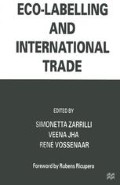Abstract
Eco-labelling aims to promote the consumption and production of environmentally more “friendly” products by providing information to consumers on their environmental effects, in principle based on a life-cycle approach. This paper points out that while eco-labelling is essentially aimed at environmental purposes, it may at times result in discrimination against foreign producers and act as a non-tariff barrier to trade. Developing countries are becoming more exposed to the effects of eco-labelling as some of the new product categories which are being selected for eco-labelling are of export interest to them. In addition, in the case of these product categories, upstream environmental effects may be seen as more important than those related with consumption and disposal. Thus, criteria tend to be developed regarding raw materials and production processes, which may be difficult to comply with for foreign producers. This paper examines the possible environmental and, in particular, trade effects of eco-labelling on developing countries. It reviews the main issues which are currently being deliberated in a number of forums, including the United Nations Conference on Trade and Development (UNCTAD). It draws considerably from reports prepared by the UNCTAD secretariat to aid deliberations on eco-labelling in the Ad Hoc Working Group on Trade, Environment and Development.2
1. The opinions expressed in this paper are those of the author and do not necessarily reflect the views of UNCTAD. The designations and terminology employed are those of the author.
Access this chapter
Tax calculation will be finalised at checkout
Purchases are for personal use only
Preview
Unable to display preview. Download preview PDF.
Notes
Differences in environmental infrastructures across countries have a large impact on valuations of what is a “cleaner product”. For example, if municipal waste-water treatment plants already have phosphorus cleaning, as in Denmark, the use of phosphorus would be preferred to other calcium-binding substances. Another example refers to fly-ash. A number of countries have built up infrastructure to allow to use fly-ash as a raw material in the cement industry (in Denmark, practically all fly-ash is used in cement production). Thus, certain activities that produce fly-ash, such as burning of coal, are valued differently as compared to other countries. See Helle Petersen, “A Possible (International) Implementation Strategy for Product Oriented Environmental Policy Measures”, in International Workshop on Product Oriented Environmental Policy, Workshop Proceedings, The Hague, 30 September–1 October 1993.
Environmental Choice Program, Environment Canada, “Eco-labelling and PPMs: The international Context”, paper presented at the OECD Workshop on Eco-labelling and Trade, London, 6–7 October 1994.
Editor information
Copyright information
© 1997 United Nations
About this chapter
Cite this chapter
Vossenaar, R. (1997). Eco-Labelling and International Trade: The Main Issues. In: Zarrilli, S., Jha, V., Vossenaar, R. (eds) Eco-Labelling and International Trade. Palgrave Macmillan, London. https://doi.org/10.1007/978-1-349-25492-7_2
Download citation
DOI: https://doi.org/10.1007/978-1-349-25492-7_2
Publisher Name: Palgrave Macmillan, London
Print ISBN: 978-1-349-25494-1
Online ISBN: 978-1-349-25492-7
eBook Packages: Palgrave Economics & Finance CollectionEconomics and Finance (R0)

